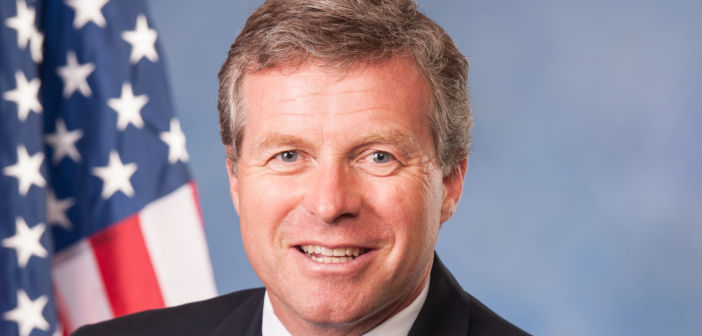Former Rep. Charlie Dent, ’93G, returned to Lehigh on Tuesday, Feb. 11 to deliver 2020 Kenner Lecture on Cultural Understanding at Zoellner Arts Center’s Baker Hall. The Brown and White sat down with Dent, who was a Republican member of the U.S. Representative for Pennsylvania’s 15th congressional district from 2005 to 2018, when he decided not to seek re-election. Dent is now senior policy advisor to DLA Piper and a political analyst at CNN.
Q: Could you address some of the similarities and differences in the political climate that you might have noticed between your time in Washington and now?
Charlie Dent: I had spent 28 years in elected office, and 14 of those years were in Harrisburg at the state legislature. I left the state legislature in 2004/2005, and what I noticed was that, I always said Harrisburg could be a painfully pragmatic place. There was no deal that couldn’t be cut. Almost pragmatic to a fault, I mean, it was that kind of a place. Washington, on the other hand, when I first arrived, I thought was excruciatingly ideological. Not very pragmatic. Over time, Harrisburg has looked more like Washington, and Washington has changed, too. What I noticed was that just performing the very basics and fundamentals of governance became exceedingly difficult. Just keeping the government open for a few months. What used to be called, ‘continuing resolution,’ — to fund the government from September 30 through the middle of December so you could finish the appropriations bills and get them all done. Well, passing those simple continuing resolutions became very difficult. When I first arrived in Washington, that took about 30 seconds. Passing a continuing resolution at the end of September, OK, got to keep the government funded until we actually fund the government on a more permanent basis. Things like that, or debt ceilings, having debates about whether or not the country is going to default on its obligations, risking the full faith and credit of the United States, nobody likes voting for a debt ceiling but the alternative is economic armageddon — it’s unthinkable. And so we would have these types of debates, so just performing the basics and the fundamentals became extremely difficult. And as members of Congress became more and more concerned about challenges from their flanks – from their primaries – that has also made running Washington much harder.
Q: Leading a group of moderate Republicans, what do you think one of the more important roles of that duty, especially as it’s become more polarized?
CD: I found in my own experience, that it was better to be a leader of a faction in Congress than to be an elected leader in Congress. And I say elected leader — speaker, majority leader, whip, conference chair — those are the elected leaders. And I found that I was able to have more influence and more impact on policy by leading a faction, because I wanted to make sure the faction was OK before they had to talk to you about everything they were going to do. Your input mattered, and when you’re in leadership, they expect you to vote for everything. If you’re in the majority they expect you to vote for every bad idea they ever dreamed up… There were times when I pushed back and there were other times where you were maybe resisting what the leadership was doing and they didn’t appreciate it. But oftentimes they did appreciate what you were doing, particularly in divided government.
When Obama was president, because as I often pointed out, the math of governing Washington is pretty straightforward. You need 218 votes in the House to pass a bill. You often need 60 votes in the Senate, particularly on matters of appropriations…which usually require a bi-partisan vote in the Senate and one presidential signature. And it really doesn’t matter who’s sitting in the chairs, whether if you have a Democratic president, a Republican House and a Republican Senate, or as I had dealt with, a Democratic president, a Republican House and a Democratic Senate, we had to put the numbers together, and really, at times, I felt that some of my colleagues in the House on the Republican side were in math denial. In other they say, ‘we need to pass something in the law, we need 218 people to vote for, so if you want the Democrats to vote for this bill, even if you had every one of them — at the time it would have been about 180 of them — well, they’re still, by my calculation, they’re still 38 votes short. We needed 218. And so, that means 38 Republicans in the House are voting for this bill, or a bill, if we expect it to become law. And we need 60 in the Senate, and at that time when the Republicans were in charge, they never had more than 53 senators. When the Democrats were in charge, you know, at times, once they had 60 back in ‘09/’10… But generally, you needed a bi-partisan vote in the Senate, and a lot of folks just couldn’t accept that reality. But being in a situation where I had the capacity to get to yes on a lot of things, that would make me relevant.
Q: Do you think polarization is something we can reverse course on, or do you think we’re headed in a more complicated and sticky situation than in previous years?
CD: I can deal with a certain amount of polarization and a certain amount of stalemates at times. But what I find more troubling is that when you have excessive polarization, that can yield a paralysis. You just can’t more, you’re stuck. And that’s the problem — when people are paralyzed — when people are very good at telling you all the things they can never do. Some of these guys, they always say that they were very good at telling you all the ways they were going to get to ‘No.’ At some point, people have to say ‘Yes.’ It’s very basic — it’s fundamental. I mean, if your job is coming down there and blow the place up, well then you can say ‘No’ every day. But when you’re in the majority, you have a special responsibility to actually govern. What I found frustrating was, I never considered myself to be that smart, but I did understand tactics, and how the Congress worked.
I would often tell some of my House colleagues, I said, ‘You know, the only things that become law around here are things that can get over 60 votes in the Senate. So, if we want to send over some stink bomb to the U.S. Senate and then huff and puff — well, I can’t believe they didn’t pass it as we sent it to them,’ Well, you shouldn’t be shocked. As I would say, ‘If you want to jam the Senate, if you want to force the Senate to take up what you sent them, you need to pass it with a strong bi-partisan majority.’ You get close to 300 votes, the Senate is going to eat it. But we don’t do that very often in the House. So, we will send over a very partisan bill, and then it will come back with over 60 votes in the Senate — it will be fairly bi-partisan — and then the House will be forced to eat it. Well that’s the reality of our predicament. There were many members who could never vote for a compromise.
Q: What do you hope to see in this coming election, or in future years, about the way that parties can work together and maybe cross party lines.
CD: Anger motivates a lot of politics, how people behave. Fear — a lot of fear in Washington. A lot of members of Congress are afraid of their political bases. And a lot of the elected leaders in Congress are afraid of their members. And, until these folks realize that there is a political reward for consensus and compromise — you don’t see it right now — but if they sense a reward for consensus and compromise, they’ll do more of it. Right now, many see their political safety as tacking hard to the base. Right or left. It’s been a problem on the right for some time, on the Republican side for some time. It is becoming a bigger problem on the Democratic side, it is becoming a problem on the Democratic side. Republicans always had folks who were demanding litmus test issues, this is before Trump, are you doctrinaire enough on issues like abortions, or firearms, or taxes or trade, or pick your favorite ideological issue. Democrats are now facing that on the left. Think the ‘Squad,’ Alexandria Ocasio-Cortez, Ilhan Omar, Rashida Tlaib and Ayanna Pressley. The four of them — they’re freshman members, and they’re talking Medicare for all, abolish ICE, open borders, Green New Deal, free college, free everything. And a lot of these Democratic members are feeling real pressure to embrace some of these positions, even though they know better. A lot of this stuff is just a fantasy and fiscally reckless beyond all imagination, but it’s not stopping them. But that’s what’s happened though, and on the right, we’ve seen this. So, here comes Donald Trump, who is many things. But one thing we would all agree on, is he is not doctrinaire. And he is not ideological. In fact, he’s completely transactional and there’s only two issues I can tell where he has maintained any consistency over the years. And that is on the issues of trade and immigration, where he’s a protectionist on trade and a restrictionist on immigration. Other than that — completely transactional. So that’s what’s changed.
That’s where Trump missed his opportunity. As a guy who is transactional, and not ideological, one would have thought that he might have been able to put together some real deals. But he hasn’t, because it seems that his political base tends to be on the Freedom Caucus side, not the more pragmatic members. Those guys will wear the MAGA hats and say ‘Amen,’ but I think Trump has missed opportunities on issues like immigration, where he could have had agreements, given his transactional nature. I thought, as a guy who was a bit more transactional, somewhat pragmatic, I thought social issues is where he would have been a little more pragmatic, when, in fact, that’s not what’s happened. He’s become more doctrinaire on those issues, now that he’s in the White House, as a way, I think, to feed his base, and has been reluctant to enter into real agreements with Congress because he’s worried about keeping his base together all the time. Most presidents try to expand their base. And probably no one other than Trump would have that ability — his base was with him. I thought he had a greater opportunity, but he has chosen just to tack hard to the base, keep throwing red meat in that direction, and as a result, he’s alienated a lot of the swing voters and he hasn’t been able to get many agreements done, other than trade. Which frankly is more favorable to the historical Democratic position, I think, than the Republican position.
Q: In regards to your time at CNN, what intersections have you noticed with media and politics?
CD: Congress is very reactive to the news at the moment, whatever it is. Sometimes they make the news, sometimes it’s news that’s beyond their control. Whatever is happening in the world, whatever issue was discovered by the media, for example, can drive the narrative. And so, Congress often reacts — it’s a very reactive body — it reacts to what’s going on. Being at CNN, I’m not on the news side, I’m on the opinion side, you know, a talking head. And so, what I find is that we end up, kind of watching it closely, we tend to talk about a lot of the same issues throughout the day — the news cycle. We operate in these news cycles. What’s interesting is that the news cycle can just change so rapidly, particularly with Trump. Here comes another Tweet, he was attacking Joe Manchin, calling him a ‘munchkin’ the other day, a prayer breakfast attack last week. Of course, the State of the Union — not shaking the hand, her tearing up the speech. There’s so many things that drive the narrative. Here comes New Hampshire or Iowa Caucus — Iowa Caucus meltdown. All these things change, so the media narrative — they can call me from CNN, ‘Hey, I’m going to have you come on tonight to talk about X.’ Well, the media cycle since that call, maybe they called me a six or seven hours before the program. The media cycle could have changed three or four times. ‘Well guess what, we don’t need you now.’ Or, I’d get a call very quickly, ‘Hey, can you comment right now? We need you, like, can you show up fast?’ This happens all the time.
So, the news cycles are so rapid now, you got multiple news cycles or stories in a day that can just disrupt programming. It makes these producers crazy, because they have to put together a program, and then the program changes out of necessity, just because the news cycle has changed. Everything is instantaneous now. When I was in Congress, I’d come off the floor and I was in a hearing, I’m doing whatever I’m doing — and I don’t have the television on or I’m not looking at my phone every second — and they ask me a question about whatever just broke. I don’t have time to think about it, you just have to react. That’s what has changed — the news moves so quickly now. The news cycle can change multiple times in a day, in ways you don’t anticipate. You can wake up in the morning thinking we’re all going to be talking about one issue, and by the end of the day, we’re talking about completely different stories.
Q: And when you first started, this wasn’t the case at all?
CD: When I first started in Congress, no, we were always reacting to the news cycle. But now, because of social media, I think it’s changed a lot. I think that has changed quite a bit. I mean, the news cycle seems to be changing at a more rapid base, and I don’t see it slowing down any time soon.






Comment policy
Comments posted to The Brown and White website are reviewed by a moderator before being approved. Incendiary speech or harassing language, including comments targeted at individuals, may be deemed unacceptable and not published. Spam and other soliciting will also be declined.
The Brown and White also reserves the right to not publish entirely anonymous comments.
1 Comment
I’m shocked that Charlie was that naive about Trump, who’s been in our backyard for decades, and has been the same guy from the start. He’s not a dealmaker, he’s a thug. He’s not even a good thug. All he knows is to stand around and squint at people, throw money and say I’M VERY RICH, HERE’S A RUDE THING. And then hire people to commit fraud on his behalf.
All I can think from this is that Charlie is one of these guys who thinks he’s on a team with other guys who all dress and talk the same, and they want like hell to believe they’re a great big club, so if a guy approaches looking kind of like them, they’ll ignore whatever’s flashing and saying “totally not like you, bro.” And they’ll ignore it right to the end, some of them.